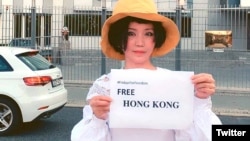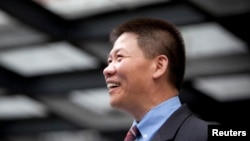EDITOR'S NOTE: Paragraphs 9-11 have been updated to include a comment from China's embassy, that came after publication.
A journalist for Radio Free Asia is among three critics of China critics whose identities were used in an elaborate plot to make false bomb threats.
The plot dates to October 2022 when as yet unidentified people booked dozens of rooms at luxury hotels in at least six countries throughout North America, Europe, and East Asia, Axios reported Wednesday.
The bookings were made using the personal information of three individuals: Germany-based Radio Free Asia reporter Su Yutong and activists Bob Fu in the United States and Wang Jingyu in the Netherlands.
Like VOA, RFA is an independent news network under the U.S. Agency for Global Media.
The perpetrators then called in at least 14 fake bomb threats to some of those hotels, falsely identifying themselves as these people. The threats led to police investigations and even the brief detention of one of the activists, according to two of those affected and published news reports in Axios.
Law enforcement in the U.S., Germany, the Netherlands, Macao and Hong Kong are investigating the incidents.
Transnational repression
Those targeted and analysts believe the plot is a Chinese-sponsored action in retaliation for the targets' criticism. All three individuals whose names were used have previously faced harassment and retaliation over their public criticism of Beijing.
Experts say the incidents underscore China’s broader efforts to intimidate and target dissidents and critics living outside the country through a process called transnational repression.
A spokesperson from China's Washington embassy, named Liu Pengyu, told VOA Thursday that he was not aware of the specifics of the case but that China "firmly opposes" the U.S. smearing its reputation.
"The accusation of 'transnational repression' is totally made out of thin air. The U.S. attempt to hype up 'China threat' and tarnish China’s reputation is doomed to fail," the spokesperson said via email.
The U.S. should "stop groundless accusation and smearing against China, and do more to promote China-US relations," the spokesperson added.
RFA journalist Su told VOA on Wednesday that she thought only a state actor had the financial means to pull off such a plot — and that Beijing had the most to gain.
Su became aware of the campaign when someone booked a Berlin hotel under her name in November, she said via a messaging app.
“After the suspect booked the hotel under my name in Berlin, he sent me a message directly, saying that I was an anti-China reporter, smearing China, and that he wanted to kill me and rape me,” she told VOA.
Efforts 'hurt our spirit'
The hotel bookings and false bomb threats continued until as recently as last month, she said. At that point, she received a barrage of phone calls from several hotels and police stations in cities from Houston and New York to Istanbul and Hong Kong.
“These harassments and threats have not resulted in direct physical harm, even if they hurt our spirit,” Su said.
Rohit Mahajan, RFA’s chief communications officer, told VOA that the network was “aware of this relentless campaign targeting our journalist and is working directly with her and appropriate authorities.”
“RFA reporters are frequently harassed and persecuted, given the sensitive nature of our work. RFA applies urgency to any act that threatens or compromises the safety of our journalists,” Mahajan said.
Yana Gorokhovskaia, an expert in transnational repression at Freedom House, said governments that employ these tactics often use accusations of terrorism against diaspora members who speak out against authoritarian governments.
“China is the world’s most prolific perpetrator of transnational repression,” Gorokhovskaia told VOA. “The tactics it uses to target dissidents and diasporas are hugely varied and clearly — as reports of swatting suggest — expanding.”
Swatting refers to false claims made to law enforcement of criminal activity, which are often intended to result in a police raid on an individual’s home or workplace.
Fu, a Chinese American pastor and the founder of the legal aid group China Aid, said he thought he was targeted after he helped Chinese activist Wang escape to the Netherlands from a third country.
“The only reason they want to use these tactics is to silence my voice,” Fu told VOA. He said he now was worried about his and his family’s safety, and that he wanted the U.S. Justice Department to investigate.
Still, Fu said, “I took a lot of comfort that they targeted me, in the sense that they target me because I must have done something really right.”
Su has long been a target of Beijing. A former state journalist, she was put under house arrest in 2010 for distributing a banned book about former Chinese Premier Li Peng, who oversaw the 1989 Tiananmen Square massacre. She escaped China and fled to Germany that same year.
She told VOA previously that Chinese authorities had threatened her parents, and about attempts made by a person she suspected was a Chinese operative to access her home in Germany.
Taking a toll
Su said the latest wave of harassment had taken a toll, leading her to move to an undisclosed residence after authorities urged her to take measures to protect her safety.
“Frankly, I have been depressed for a long time,” she said.
The harassment has included rape and death threats, as well as fake escort ads that resulted in men showing up at her Berlin apartment last June looking for sex.
“They want me to ‘socially die’ instead of actually killing me,” Su said.
But like Fu, she said she thought the harassment was proof that her reporting had struck a nerve with Beijing.
“They just want me to give up my job and stop speaking out,” Su said. “But few of these harassers dare to stand in the sun.”





